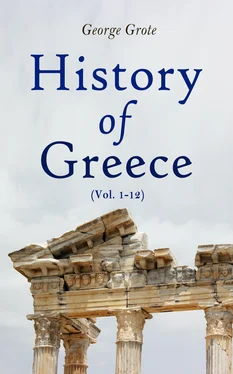George Grote - History of Greece (Vol. 1-12)
Здесь есть возможность читать онлайн «George Grote - History of Greece (Vol. 1-12)» — ознакомительный отрывок электронной книги совершенно бесплатно, а после прочтения отрывка купить полную версию. В некоторых случаях можно слушать аудио, скачать через торрент в формате fb2 и присутствует краткое содержание. Жанр: unrecognised, на английском языке. Описание произведения, (предисловие) а так же отзывы посетителей доступны на портале библиотеки ЛибКат.
- Название:History of Greece (Vol. 1-12)
- Автор:
- Жанр:
- Год:неизвестен
- ISBN:нет данных
- Рейтинг книги:5 / 5. Голосов: 1
-
Избранное:Добавить в избранное
- Отзывы:
-
Ваша оценка:
- 100
- 1
- 2
- 3
- 4
- 5
History of Greece (Vol. 1-12): краткое содержание, описание и аннотация
Предлагаем к чтению аннотацию, описание, краткое содержание или предисловие (зависит от того, что написал сам автор книги «History of Greece (Vol. 1-12)»). Если вы не нашли необходимую информацию о книге — напишите в комментариях, мы постараемся отыскать её.
History of Greece (Vol. 1-12) — читать онлайн ознакомительный отрывок
Ниже представлен текст книги, разбитый по страницам. Система сохранения места последней прочитанной страницы, позволяет с удобством читать онлайн бесплатно книгу «History of Greece (Vol. 1-12)», без необходимости каждый раз заново искать на чём Вы остановились. Поставьте закладку, и сможете в любой момент перейти на страницу, на которой закончили чтение.
Интервал:
Закладка:
We now pass to another and not less important celestial personage—Apollo.
The legends of Dêlos and Delphi, embodied in the Homeric Hymn to Apollo, indicate, if not a greater dignity, at least a more widely diffused worship of that god than even of Dêmêtêr. The Hymn is, in point of fact, an aggregate of two separate compositions, one emanating from an Ionic bard at Dêlos, the other from Delphi. The first details the birth, the second the mature divine efficiency, of Apollo; but both alike present the unaffected charm as well as the characteristic peculiarities of Grecian mythical narrative. The hymnographer sings, and his hearers accept in perfect good faith, a history of the past; but it is a past, imagined partly as an introductory explanation to the present, partly as a means of glorifying the god. The island of Dêlos was the accredited birth-place of Apollo, and is also the place in which he chiefly delights, where the great and brilliant Ionic festival is periodically convened in his honor. Yet it is a rock narrow, barren, and uninviting: how came so glorious a privilege to be awarded to it? This the poet takes upon himself to explain. Lêtô, pregnant with Apollo, and persecuted by the jealous Hêrê, could find no spot wherein to give birth to her offspring. In vain did she address herself to numerous places in Greece, the Asiatic coast and the intermediate islands; all were terrified at the wrath of Hêrê, and refused to harbor her. As a last resort, she approached the rejected and repulsive island of Dêlos, and promised that, if shelter were granted to her in her forlorn condition, the island should become the chosen resort of Apollo as well as the site of his temple with its rich accompanying solemnities. 99Dêlos joyfully consented, but not without many apprehensions that the potent Apollo would despise her unworthiness, and not without exacting a formal oath from Lêtô,—who was then admitted to the desired protection, and duly accomplished her long and painful labor. Though Diônê, Rhea, Themis and Amphitritê came to soothe and succor her, yet Hêrê kept away the goddess presiding over childbirth, Eileithyia, and thus cruelly prolonged her pangs. At length Eileithyia came, and Apollo was born. Hardly had Apollo tasted, from the hands of Themis, the immortal food, nectar and ambrosia, when he burst at once his infant bands, and displayed himself in full divine form and strength, claiming his characteristic attributes of the bow and the harp, and his privileged function of announcing beforehand to mankind the designs of Zeus. The promise made by Lêtô to Dêlos was faithfully performed: amidst the numberless other temples and groves which men provided for him, he ever preferred that island as his permanent residence, and there the Ionians with their wives and children, and all their “bravery,” congregated periodically from their different cities to glorify him. Dance and song and athletic contests adorned the solemnity, and the countless ships, wealth, and grace of the multitudinous Ionians had the air of an assembly of gods. The Delian maidens, servants of Apollo, sang hymns to the glory of the god, as well as of Artemis and Lêtô, intermingled with adventures of foregone men and women, to the delight of the listening crowd. The blind itinerant bard of Chios (composer of this the Homeric hymn, and confounded in antiquity with the author of the Iliad) had found honor and acceptance at this festival, and commends himself, in a touching farewell strain, to the remembrance and sympathy of the Delian maidens. 100
But Dêlos was not an oracular spot: Apollo did not manifest himself there as revealer of the futurities of Zeus. A place must be found where this beneficent function, without which mankind would perish under the innumerable doubts and perplexities of life, may be exercised and rendered available. Apollo himself descends from Olympus to make choice of a suitable site: the hymnographer knows a thousand other adventures of the god which he might sing, but he prefers this memorable incident, the charter and patent of consecration for the Delphian temple. Many different places did Apollo inspect; he surveyed the country of the Magnêtes and the Perrhæbians, came to Iôlkos, and passed over from thence to Eubœa and the plain of Lelanton. But even this fertile spot did not please him: he crossed the Euripus to Bœotia, passed by Teumêssus and Mykalêssus, and the then inaccessible and unoccupied forest on which the city of Thêbes afterwards stood. He next proceeded to Onchêstos, but the grove of Poseidôn was already established there; next across the Kêphissus to Okalea, Haliartus, and the agreeable plain and much-frequented fountain of Delphusa, or Tilphusa. Pleased with the place, Apollo prepared to establish his oracle there, but Tilphusa was proud of the beauty of her own site, and did not choose that her glory should be eclipsed by that of the god. 101She alarmed him with the apprehension that the chariots which contended in her plain, and the horses and mules which watered at her fountain would disturb the solemnity of his oracle; and she thus induced him to proceed onward to the southern side of Parnassus, overhanging the harbor of Krissa. Here he established his oracle, in the mountainous site not frequented by chariots and horses, and near to a fountain, which however was guarded by a vast and terrific serpent, once the nurse of the monster Typhaôn. This serpent Apollo slew with an arrow, and suffered its body to rot in the sun: hence the name of the place, Pythô, 102and the surname of the Pythian Apollo. The plan of his temple being marked out, it was built by Trophônios and Agamêdês, aided by a crowd of forward auxiliaries from the neighborhood. He now discovered with indignation, however, that Tilphusa had cheated him, and went back with swift step to resent it. “Thou shalt not thus,” he said, “succeed in thy fraud and retain thy beautiful water; the glory of the place shall be mine, and not thine alone.” Thus saying, he tumbled down a crag upon the fountain, and obstructed her limpid current: establishing an altar for himself in a grove hard by near another spring, where men still worship him as Apollo Tilphusios, because of his severe vengeance upon the once beautiful Tilphusa. 103
Apollo next stood in need of chosen ministers to take care of his temple and sacrifice, and to pronounce his responses at Pythô. Descrying a ship, “containing many and good men,” bound on traffic from the Minoian Knossus in Krête, to Pylus in Peloponnêsus, he resolved to make use of the ship and her crew for his purpose. Assuming the shape of a vast dolphin, he splashed about and shook the vessel so as to strike the mariners with terror, while he sent a strong wind, which impelled her along the coast of Peloponnêsus into the Corinthian Gulf, and finally to the harbor of Krissa, where she ran aground. The affrighted crew did not dare to disembark: but Apollo was seen standing on the shore in the guise of a vigorous youth, and inquired who they were, and what was their business. The leader of the Krêtans recounted in reply their miraculous and compulsory voyage, when Apollo revealed himself as the author and contriver of it, announcing to them the honorable function and the dignified post to which he destined them. 104They followed him by his orders to the rocky Pythô on Parnassus, singing the solemn Io-Paian such as it is sung in Krête, while the god himself marched at their head, with his fine form and lofty step, playing on the harp. He showed them the temple and site of the oracle, and directed them to worship him as Apollo Delphinios, because they had first seen him in the shape of a dolphin. “But how,” they inquired, “are we to live in a spot where there is neither corn, nor vine, nor pasturage?” “Ye silly mortals,” answered the god, “who look only for toil and privation, know that an easier lot is yours. Ye shall live by the cattle whom crowds of pious visitors will bring to the temple: ye shall need only the knife to be constantly ready for sacrifice. 105Your duty will be to guard my temple, and to officiate as ministers at my feasts: but if ye be guilty of wrong or insolence, either by word or deed, ye shall become the slaves of other men, and shall remain so forever. Take heed of the word and the warning.”
Читать дальшеИнтервал:
Закладка:
Похожие книги на «History of Greece (Vol. 1-12)»
Представляем Вашему вниманию похожие книги на «History of Greece (Vol. 1-12)» списком для выбора. Мы отобрали схожую по названию и смыслу литературу в надежде предоставить читателям больше вариантов отыскать новые, интересные, ещё непрочитанные произведения.
Обсуждение, отзывы о книге «History of Greece (Vol. 1-12)» и просто собственные мнения читателей. Оставьте ваши комментарии, напишите, что Вы думаете о произведении, его смысле или главных героях. Укажите что конкретно понравилось, а что нет, и почему Вы так считаете.












